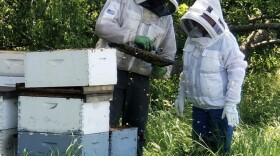The patent rights on the first genetically modified seeds expire next year, but it’s not clear how the introduction of “generic” seeds fits into the science and business of GM crops.
Farmers would love to continue using their favorite seeds in generic form – saving money while getting the same popular biotech benefits. But they may find there is only a limited window of opportunity.
Soybeans with Monsanto’s RoundUp Ready gene first showed up in the field in 1996. Today, more than 90 percent of the soybeans grown in the U.S. are RoundUp Ready. There is also RoundUp corn, cotton, canola, alfalfa, and even sugar beets.
When the original RoundUp gene for soybeans goes off-patent in 2014, it will be the first time a major biotech trait has gone generic.
“The question coming up now in ag biotech is what happens when these things come off patent,” said Tom Clemente, a plant geneticist at the University of Nebraska Lincoln. “And it’s still convoluted because it’s not straight forward like ‘Oh, I have a new wiper blade.’ It’s not the same thing.”
It’s not the same thing to seed companies like SeitecGeneticseither. The company sells seed to corn and soybean farmers in Nebraska, Kansas, Iowa and Missouri. Almost all of Seitec’s seeds contain patented gene traits, which means Seitec pays royalties to companies like Monsanto or DuPont Pioneer for rights to the technology.
RoundUp Ready soybeans may have established the biotechnology trend in agriculture nearly 20 years ago, but Seitec co-owner Dennis Bracht points out farmers have other options. Monsanto released RoundUp Ready 2 Yield soybeans in 2009. Another major seed company, Bayer, has its own herbicide tolerant soybean called LibertyLink. Still, many farmers like the original.
“Today, our top selling bean is a RoundUp Ready 1 soybean,” Bracht said. “And it was our highest yielding soybean bean this past year too.”
Bracht will continue offering those soybeans after RoundUp 1 goes off-patent, when he no longer has to pay royalties. That means savings for farmers. Bracht estimated up to a $10 discount on a $40 bag of seed.
“To me, we don’t need to overthink the combine,” Bracht said. “We put a lot of investment into our research. We go with the (seeds) that obviously yield the most and provide the best combination of agronomics.”
That’s the window that opens up for farmers when RoundUp 1 goes generic – cheaper seed that still works. But it’s not clear how wide that window will open because of additional legal protections on seed genetics and regulatory requirements for GM crops.
The ideal for some farmers would be to pack up beans from the field to reuse as seed. But Monsanto has taken more than 140 farmers to court for trying to do that with RoundUp Ready beans.
Among them is Indiana farmer Vernon Bowman, whose dispute with Monsanto reached the Supreme Court. Bowman purchased soybeans from a local grain elevator to use as seed for his second crop of soybeans in the growing season. Because much of the seed still carried the RoundUp Ready gene, Monsanto claimed Bowman owes the company technology fees.
Bowman argues that since other farmers paid fees on the soybeans the first time they were planted, Monsanto’s patent should not apply the second time around. The Supreme Court is expected to make its ruling on Bowman v. Monsanto before the end of June.
So when the patent expires can farmers start bagging their RoundUp Ready beans? Not necessarily, Seitec’s Bracht said.
“With seed it gets a little bit more complicated than that,” said Bracht. “It’s beyond just trait. It’s trait and genetics.”
Seeds have multiple layers of legal protection. The genetic trait in RoundUp 1 seeds may go generic but it is often paired with a seed variety that has its own separate patent. It’s called Plant Variety Protection. Companies like DuPont Pioneer, for instance, are telling farmers that even after Monsanto’s RoundUp Ready patent expires, their variety patents still apply.
According to Tom Clemente at the University of Nebraska Lincoln, the idea behind the patents is to cover the cost of innovation.
“The blockbusters that do make it through have to cover the losses of all the things that didn’t make it through,” said Clemente. “Now, there’s fairness in things, right? Once the patent is up there should be generic versions available.”
So farmers may not see a ton of savings. Plus, there’s one more reason there is likely a limited window for generic RoundUp Ready seed: international trade.
To allow exports of RoundUp Ready soybeans, Monsanto prepared reams of research to convince regulators in places like China, Japan and the European Union that the genetically modified soybeans were safe. Clemente said it would be hard to replicate that effort.
“When you’ve got that deep of pockets, you can do it,” Clemente said. “But a small little startup company or a university? They’re never going to be able to do it. Not even close.”
If no one keeps the paperworkd for the RoundUp 1 trait up-to-date with foreign countries and trade groups, generic RoundUp 1 soybeans cannot be sold overseas.
The major seed companies have signed on to guidelines for industry players to follow when a patent is ready to expire. Monsanto has pledged to maintain regulatory responsibility for RoundUp 1 through the year 2021.
The question is whether any competitors will be prepared to take up the job after that. If they don’t, it may be a sign the gene that changed the course of agriculture has finally grown obsolete.







